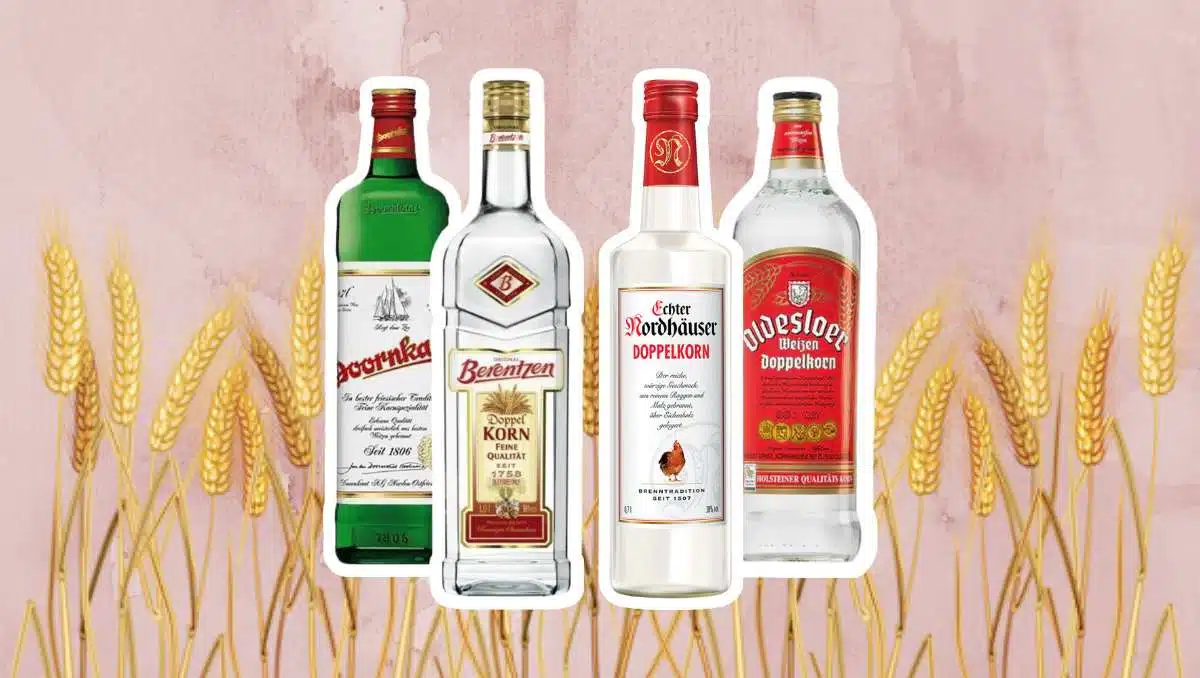Korn liquor is a huge thing in Germany, especially in the northwestern part of the country. If you've visited Germany before, you might have seen bottles of Korn in the supermarket. Brands like Nordhäuser Doppelkorn, Oldesloer, Doornkaat Doppelkorn, and Fürst Bismarck Doppelkorn are widely available. For everyone else, Korn might be a complete unknown. So, what is Korn?
Technically, Korn is a subtype of vodka, just like tequila is a specific subtype of mezcal. Korn is a strong, clear, and transparent grain spirit with an alcohol content of at least 32%. Flavor and taste-wise, Korn is much richer, though. And that's also part of why it celebrates a comeback in Germany.
What exactly is Korn?
Even if it sounds like "corn," Korn has nothing to do with it. The term "Korn" in German means "single grain." It's a German colorless distilled beverage with a minimum alcohol content of 32% ABV but often contains up to 40% alcohol.
Ultimately, Korn is a more strictly regulated subcategory of vodka. And what some don't know: Korn has its own purity law. As with the German purity law for beer, additives other than yeast and water are forbidden. In return, this means the addition of food colorings or flavorings is not permitted.
Accordingly, only wheat, buckwheat, oats, barley, and rye are allowed for distillation. In addition, production of Korn must be in Germany, Austria, or the German-speaking community of Belgium. The result is a pure and regional product without any additives.
However, the filtering process after distillation is less strict, allowing the finished spirit to have a more prominent grain and cereal taste in the finished product.
Doppelkorn vs. Korn vs. Kornbranntwein
The main difference between the two neutral strong spirits Korn and Doppelkorn (Engl. "double Korn") are the different alcoholic proofs. The standard version must be at least 32% ABV (64 proof). Strong Korn containing 37.5% (75 proof) alcohol is called Kornbrand, Kornbranntwein, or Doppelkorn. And everything above 38% (76 proof) is always called Doppelkorn.
Korn manufacturers typically write on the label whether it's a Doppelkorn or a regular one.
Korn liqueurs
Besides the higher-proof options, there are also countless Korn-based liqueurs on the market. The base for these is "Ansatzkorn." Ansatzkorn is a very high-proof version of Korn containing about 80% ABV, infused with fruits, herbs, and other ingredients. Some famous examples of Korn liqueurs are Zirbenschnaps (liqueur flavored with stone pine cones, popular in alpine regions) and fruit-flavored products like Berentzen Apfelkorn (apple-flavored Korn liqueur).
Such liqueurs are mixed with sweeteners and water to achieve a much lower alcohol content of 20% to 25%. You can get local variations in all parts of Germany, but also neighboring countries like Austria.
Aged Korn
Inspired by the newfound love for Korn, some distilleries have been coming up with new ideas. Just like Brandy and other aged spirits, they started barrel-aging Korn. Two of those premium distilleries are Heydt and Sasse.
Heydt produces several aged Korn products. These distillates age up to eight years in former Whiskey, Cognac, or Sherry casks. When you buy them in Germany, you can get these bottles starting from $20 or 18€.
Sasse produces something even more exclusive. Their Bordeaux-cask-finished Korn is sold for a whopping $380 or 350€. Sasse is classified as World-Class Distillery by the World-Spirits Guide and knows how to produce premium products.
As the market for premium Korn slowly grows, I feel these aged Korn products are not the last we have heard of.
How to drink Korn?
Korn is typically served and consumed as a "Kurzer" - a small-sized shot (20ml or 2/3 oz). It is often combined with soft drinks like Fanta - the celebrated Fanta-Korn. This mix is well-known for delivering the worst hangovers, so probably stay away from this combination.
Instead, have a look at the "Herrengedeck." The Herrengedeck - or Gentleman's Menu (literal translation "gentlemen's place-setting") - has a long tradition in German drinking culture and is available at bars in most parts of Germany. Ordering a Herrengedeck at a bar or restaurant will get you a beer and a shot glass of Korn on the side. -this creation is pretty similar to the Boilermaker cocktail.
In rare cases, Korn is also mixed with a soft drink mixer such as Coke or Fanta. Lately, the grain spirit is also becoming popular with many craft cocktail bars as a substitute for vodka. In contrast to the almost flavorless vodka, Korn has a more intense grainy taste. That is because the spirit doesn't get filtered like traditional vodka and, hence, keeps more flavors in the finished product.
Korn cocktails aka Korntails
As more and more bartenders started to look at Korn as a new cocktail ingredient, the so-called Korntail movement began. Korntail is a newly created term for mixed drinks based on the grain spirit.
One of the best places to get familiar with these drinks is probably the beach bar Geeske & der swarte Roelf on the island of Borkum. The establishment has the largest selection of Korn in Germany. More than 74 different Korn products are on the menu. Besides this gigantic selection, the bar also serves incredible cocktails based on Korn.
Step-by-Step Guide: How Korn is Produced
- Grinding the Grain: The production of Korn begins with grinding the grain in a grist mill to create a fine powder.
- Creating the Sour Mash: Hot water is added to the ground grain, resulting in a paste-like consistency called the sour mash.
- Producing Malt: Barley is soaked in water, causing the grain to produce enzymes that convert the starch in the sour mash into sugar.
- Sweet Mash Formation: The combination of sour mash and malt forms the sweet mash, ready for the next step.
- Fermentation: Yeast is added to the sweet mash, fermenting the sugar and converting it into alcohol.
- Distillation: The actual distillation process begins, where the alcohol, escaping as steam, is distilled several times to remove undesirable flavors and odors. Korn is distilled at least twice, while Doppelkorn undergoes multiple distillations.
- Fine Distillate: The final distillate, known as "Korn fine distillate" (Kornfeindestillat), reaches around 85% alcohol by volume.
- Dilution: The fine distillate is diluted with water to reach drinking strength. The type and taste of water used can impact the final flavor of the Korn, with spring water often preferred.
- Aging (Optional): Some high-quality grain brandies are aged in oak barrels before dilution, adding a harmonious bouquet, a slight color nuance, and flavorful accents to the finished Korn.
Grains used to make Korn
Only five types of grain are permitted for production.
- Rye
- Wheat
- Barley
- Oats
- Buckwheat.
Most products are based on rye or wheat; oats and buckwheat hardly play a role. Barley is mainly used to obtain the malt required for the brewing process.
The history of Korn
Korn was first mentioned in 1507 in Nordhausen, Thuringia as "distilled water." Back then, Korn, or Kornbrands, was so well-liked that a ban on grain brandy was imposed in Nordhausen in the mid-16th century. The reason was presumably a protest by beer brewers and bakers in the same area disputing grain and malt. But only 30 years later, the ban got party lifted.
In 1789, again in Nordhausen, the first purity law for grain brandy was issued. It stated that two-thirds rye or grain and at most one-third barley or malt could be used for distilling.
The first half of the 20th century ruined many manufacturers. Especially to smaller producers because World War I and II led to a shortage of grain and copper for the distilleries. It took quite some time for the industry to recover, but eventually, it did.
Today, the bulk of industrial production is in Nordhausen in northern Thuringia, Haselünne in Emsland, and Oelde in Westphalia. All the distilleries producing Korn account for a quarter of German spirits production.
Other use cases of Korn
Even today, many households in Germany use high-proof spirits like Doppelkorn or Ansatzkorn as a disinfectant for domestic use. Children who graze their knees on the playground are often treated by their grandmothers with handkerchiefs soaked in Korn to disinfect the wound.

